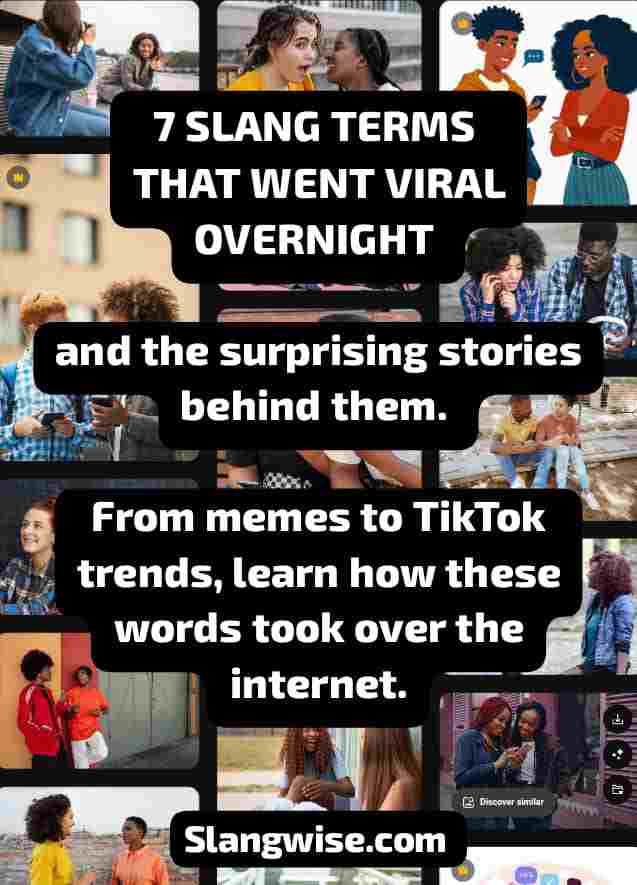Slang once traveled by word of mouth or dashed-down notes in class. Today, a phrase can ignite across continents in minutes. Platforms like TikTok and X serve as modern-day town squares, where catchy words flare up, spread, and sometimes fade just as fast.
This article explores seven slang terms that exploded overnight, tracing their humble beginnings, the moment they blew up, and the cultural forces that kept them alive.
Table of Contents
In a Nutshell
- Instant Impact: These seven expressions went from zero to everywhere in just hours, thanks to memes, influencers, and platform algorithms.
- Hidden Origins: Each term has a backstory, some spring from subcultures, others from songs or viral videos, that explains why it stuck.
- Platform Power: TikTok, Twitter (X), Instagram Reels, and YouTube Shorts acted like launchpads, turning niche phrases into global phenomena.
- Cultural Snapshot: Viral slang captures the mood of its moment, whether playful, ironic, or defiant, and often reflects broader social trends.
Slangwise Thought:
A viral slang term is more than a word, it’s a snapshot of the internet’s collective heartbeat.
Slang Words That Went Viral Overnight
1. Rizz
Rizz in Gen Alphas slang means short for charisma, especially the charm used in flirting. It was first used in streetwear and sneakerhead circles, but truly broke out when livestreamer Kai Cenat started critiquing friends’ romantic game as “no rizz” or “peak rizz.”
Viral Moment: A clip of Cenat joking about someone having “negative rizz” blew up on TikTok. Creators then began rating each other’s rizz, sharing tips on “how to level up rizz,” and staging playful contests.
The slang Rizz went viral because it’s brief, punchy, and flexible, usable as noun (“bragging rights for rizz”), verb (“rizz someone up”), or adjective (“that’s very rizz”). Its adaptability made it a social media favorite, in fact it was the Oxford English Word of the year 2023.
2. NPC
NPC was borrowed from gaming, and it means “Non-Playable Character”: it refers to people acting on autopilot, repeating canned lines, or lacking independent thought. Players noticed predictable game characters and dubbed them NPCs.
On TikTok, users dressed and acted like NPCs, responding to on-screen prompts (“ice cream, yum!”) as viewers spooled in “gifts.”
Viral Moment: Creator PinkyDoll’s NPC-themed livestreams earned millions of views and thousands of dollars per stream. Other streamers and influencers imitated the shtick, making it an overnight trend.
NBC now serves as both playful roast and critique of herd mentality. Calling someone an “NPC” cuts through complex debates about conformity with one swift gaming reference.
Try the Slang Quiz to test your slang skills
3. Slay
Slay in Gen Z Slang means to perform brilliantly, look stunning, or dominate a situation. It was born in Black and LGBTQ+ ballroom culture of the 1980s, “slay” was popularized by voguing communities to mean “own the runway.”
Viral Moment: A TikTok sound clip of a runway coach shouting “SLAY!” during a fashion challenge went viral in late 2022. Users layered it over everything from makeup tutorials to pet videos.
The slang Slay combines positivity with a punchy delivery. Saying “you slayed” delivers an instant boost of approval, which fuels repeat usage.
4. No Cap
No cap = No lie: a way to emphasize sincerity. The opposite of “cap” (lie or exaggeration). Historically, No cap was traced to Southern hip-hop in the early 2010s, rappers like Young Thug used “cap” to call out dishonesty. Fans adopted it online, flipping between “cap” and “no cap.”
Viral Moment: High-profile mentions by artists such as Drake and Offset in songs and interviews propelled “no cap” into mainstream youth speak around 2022. Memes and reaction videos cemented its place.
It’s versatile, workable in rapid-fire text convos, video captions, or spoken replies. The cap/no cap binary neatly conveys truth versus fiction.
5. Touch Grass
Touch Grass in slang is a tongue-in-cheek command to log off, go outside, and reconnect with real life. Touch grass is commonly used in gaming and Reddit forums, it originally served as a lazy insult toward overly online individuals.
Viral Moment: A montage of streamers and gamers being told to “touch grass” in response to heated chat arguments took off on TikTok in early 2022. Soon, celebrities and news outlets quoted it when discussing screen-time overload.
It captures digital burnout in two simple words, plus it doubles as self-care advice. Everyone from execs to students started reminding themselves to “touch grass.”
The New York Times explored screen fatigue and coined similar terms in its media coverage (NYT: The Excessive Screen Time Phenomenon).
6. It’s Giving
A way to describe the vibe, energy, or aesthetic of something. E.g., “It’s giving CEO energy” means “It feels powerful and authoritative.” Stemmed from queer Black vernacular and fashion critiques, used to praise or mock an outfit’s aura.
Viral Moment: Beauty and style influencers on Instagram Reels began captioning transformations with “it’s giving…” in 2022. TikTok users adopted it for everything from cooking fails to luxury unboxings.
It’s giving is endlessly adaptable, complete the phrase with any noun or concept, serious or absurd. The format invites creativity and humor.
7. Skibidi
Skibidi is yet another Gen Z playful, nonsensical utterance that evolved into a viral dance and meme. Skibidi was created by Russian channel DaFuq!?Boom! in the “Skibidi Toilet” animated series, featuring surreal battles between singing toilets and camera-headed agents.
Viral Moment: A catchy Skibidi soundtrack clip paired with a simple dance routine spread like wildfire on TikTok in late 2023. Remixes, fan art, and parodies erupted across platforms.
Its outright absurdity struck a chord. In an era of polished branding, “Skibidi” thrived by being gloriously random. YouTube analytics firm Tubular Labs tracked “Skibidi” as one of the fastest-growing meme franchises of 2024.
Anatomy of Viral Slang
The factors below combine to create a wildfire effect: a single clip or tweet can spark millions of imitations. The more relatable and adaptable a slang term is, the longer it lingers in everyday speech.
While each term has its own backstory, they share four core ingredients:
- Memetic Simplicity: A sound bite or two that’s easy to repeat and remix.
- Emotional Hook: A trigger; humor, validation, irony; that resonates instantly.
- Cultural Alignment: Rooted in subcultures (hip-hop, gaming, LGBTQ+) before gaining mass appeal.
- Algorithmic Boost: Early engagement on TikTok, X, or Reels signals platforms to push the content further.
Key Takeaways
- Speed of Spread: Slang can cross from niche chat rooms to global usage in under 24 hours.
- Subcultural Roots: Most viral terms originate in specific communities before breaking out.
- Platform Dynamics: TikTok’s “For You” feed and X’s retweet culture serve as accelerators for catchy phrases.
- Cultural Mirror: Viral slang captures the values, humor, and frustrations of a moment in time.
Conclusion
These seven expressions illustrate how digital language evolves at breakneck speed. From rizz to skibidi, each term tells a story of creativity, community, and the power of platforms.
Observing these viral slangs offers a window into how people connect, entertain each other, and forge shared experiences online.
As long as algorithms favor engagement and humans crave novelty, expect new slang sensations to emerge overnight; ready to reflect the next big cultural moment.

